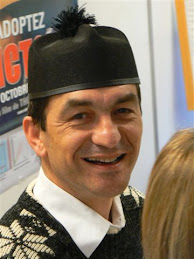Mom is very happy. Little Sara, one year old, just did with her hand the “gesture” that Mom had been trying to teach her for some weeks. It’s not her first success though. Little Sara has been increasingly successful with all kinds of gestures lately. She is able to wave to Dad when he leaves in the morning. She knows how to clap her hands, grab a toy, and hold her bottle. So tonight she was able to do this new gesture.
Little Sara understood that you do the gesture when sitting at the table, before Mom brings Sara’s plastic plate. Mom and Dad do the gesture too, and then they bow their heads, close their eyes. When Little Sara imitated it, it made them so happy!
Grandma is very happy. Little Sara, two years old, just did the gesture as they were in the church. Grandma did it when entering, and now Little Sara also did it nicely. Grandma is so proud. Little Sara understood that after doing the gesture, Grandma says something, usually beginning by “deergod”. Little Sara knows that after the gesture you ought to stay quiet. If you don’t, they look upset and take you out.
Little Sara is now three years old. She is able to say the words together with the gesture. “In the name of the Father and the Son and the Holy Spirit.” She knows she can bring great joy to her parents when she does it at the beginning of the family prayer. Of course Little Joshua doesn’t do it yet. He is just a baby. Then Mom or Dad say “deergod” and talk about the day, or about Grandma, or about other people. Then it is bed time and Dad reads the story of Willie the Bear.
Little Sara goes to preschool. The teacher was very impressed that Sara was able to do the sign of the cross. Not many children are. Little Sara knows about Dear God, how to talk to Dear God, what kind of thinks you say to Dear God. She knows about Dear God’s family, about Mary and Jesus.
Sara is now seventeen years old. She is a senior in high school. She comes back home tonight troubled. At the dinner table, she tells that the theology professor explained today that there is no evidence of the existence of God. She has been thinking about it all day. Sara realizes that there are a number of things in her life that she has never questioned though they are her daily realities, things that are obvious in her life, not only obvious, but important and that she holds for true. So many things that she always has accepted indisputably. For example she knows that God loves her. She has always known it, ever since she was a child, and she has had many signs of it. She was taught by her family how to search for and recognize the signs of God’s grace every day. Actually, Sara thinks, when you learn how to apperceive the signs of God’s blessings, you are able to enter that reality and you love it. Sara has gone on youth retreats with the diocese, and she has experienced the presence of God, the peace of God’s forgiveness, the deepness of the scripture, the importance of personal commitment in at least one outreach program.
Sara is much involved in the Christian Youth Network. It’s her life ever since she got out of college. She was hired by the diocese as a community organizer. She is very happy with this job. She has discovered that her commitment to her community includes a larger universal communion with people from all over the world and from all along history. The presence of God in this world and in her life is not only a personal, intimate belief but also an experience shared by thousands of people around the globe and back in time. What she holds for true about God is rooted in her own history, in her community, in the larger communion of the Church, in the reflection of theologians, in the commitment of holy people. With all her mind, soul, experience, she knows the reality of God in her existence. It makes her happy.
Sara got married. She and Ignacio are expecting a boy. Ignacio is Italian. He grew up in Milano. Like many people in
How does Sara know that what she holds for true is indeed true? How does she argue about the truth of her beliefs? Articulate epistemology requires articulate psychology; we must look at the psychological “mechanisms” involved in belief formation. In this narrative, I have tried to illustrate that our reason is influenced by our context. When she realized that she never questioned a number of beliefs she had always hold for true, and remained faithful to them, did Sara stick to reasonably verified beliefs or to her context of happiness? I wonder what grounds the reasons for which one may reject his beliefs. I suspect an existential gain will help. For example if faith has never been strongly significant in Ignacio’s life, he may – for the love of Sara - find himself convinced by her faith beliefs. Many people convert to their spouse’s religion when it is imposed as a requirement for marriage. A existential gain greatly helps reason. Does psychology rule our reason?


Aucun commentaire:
Enregistrer un commentaire